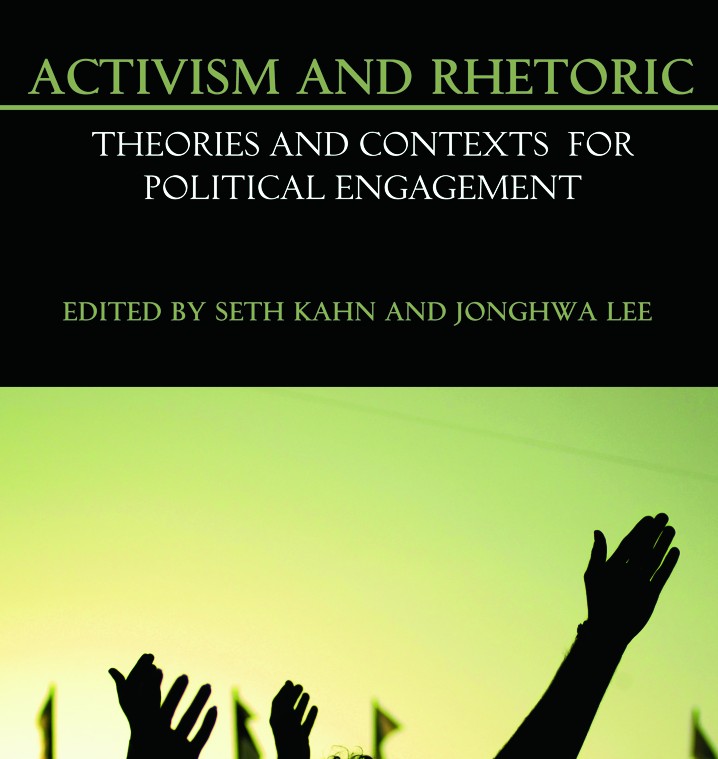Making Rhetoric Visible: Re-visioning a Capstone Civic Writing Seminar
Article PDF
Recently, a regional master’s-granting institution in the Southeast enrolling fewer than 5,000 students piloted a junior/senior year interdisciplinary capstone writing seminar. The placement of the course late in the curricular sequence and the interdisciplinary student population afford a unique opportunity to examine the use of rhetoric in the curriculum. Many instructors and students understand the distinctive value of rhetoric to the course, and the students’ work and engagement with civic discourses illustrate the relevance of rhetorical training to their liberal arts education. What appears to be missing is a coherent vision of the course for a broader audience—namely, instructors across the campus who don’t teach the course.
In committee meetings, academic and student affairs retreats, or simply in chance encounters with colleagues, a periodic response to the mention of the course is polite confusion, misinformation, or even outright dismissal of its purpose and products. The reasons for these responses are material for another paper. What I’ve come to understand is the need for a philosophical justification of the course beyond the gentle retort that it’s part of our General Education program, or that it directly fulfills part of our mission statement, or even that students are doing valuable work as citizens in their chosen community. Toward the end of developing a deeper understanding of the course, I will explain Isocrates’ work as foundational support for cross-disciplinary conversations.
Rhetoric and Our Work in Education
Our capstone writing course is a specific call to action to students as they are asked to address—in writing, speaking, and research—a public issue of civic importance. This call to action corresponds with the work of Merrill and Miller and their 2007 text “Making Learning Visible: A Rhetorical Stance on General Education.” In their work, Merrill and Miller assert the well-established claim that we can best put the collective knowledge of students to use through a platform of rhetorical principles. They write:
Rhetorical analyses of how audiences, situations and purposes are negotiated can foster the sort of metacognitive awareness that includes the emotionally engaging modes of understanding fostered by humanistic studies such as literature, and rhetoric can help students apply such modes of interpretation and identification to practical action. (210)
While this call is not new (see Wells, Cushman, Glenn, et al. to name a few), it is a push connected to Bruce Herzberg’s implicit suggestion in 2000 that we, in composition studies and liberal arts education, begin a program of rhetoric across the curriculum. He writes: “[Rhetoric’s] function [is] to make the knowledge supplied by the other disciplines useful in the public sphere. Rhetoric [during Greek society] made academic knowledge consequential by bringing it to bear in society.” This suggestion explains the need for rhetoric within writing courses to be central in General Education courses, particularly at the senior level. I see this claim as part of a broader, more progressive understanding that, instead of the writing curriculum being a service course to the academy, rhetoric should function as an integral part of the knowledge-making paradigm throughout the academy.
Rhetorical Mobility through Isocrates
In articulating the content of the course, I turn to Isocrates1 and his assertion that rhetoric makes education mobile. In Antidosis, Isocrates’ goal for education is to produce the wise and thoughtful citizen-orator by, “guiding students how to apply rhetorical principles to political situations, how to meet the demands of changing circumstances, and how to make choices about future courses of action” (Poulakos 45). Education was to start with the training of the mind and body in philosophy and gymnastics. Isocrates’ vision of education implies the complementary relationship that our capstone writing course should enjoy with the preceding coursework of the student.
In Antidosis, Isocrates outlines the work of students’ continuing education in “philosophy,” which is much like our system of 300- and 400-level courses in the discipline:
Then, when [the instructors] have made them familiar and thoroughly conversant with these lessons, they set them at exercises, habituate them to work, and require them to combine them in practice the particular things they have learned, in order that they may grasp them more firmly and bring their theories into closer touch with the occasions for applying them. . . Watching over them and training them in this manner, both the teachers of gymnastic and the teachers of discourse are able to advance their pupils to a point where they are better men and where they are stronger in their thinking or in the use of their bodies. (89-290)
Our students come to us in the capstone writing course from their disciplines as “good students” who are advanced and “[strong] in their thinking.” Our goal is Isocrates’ goal—to bring them together for the rhetorical training of active-citizen-orators. This term, “active-citizen-orator,” combines our institution’s mission and Isocrates’ educational vision.
Process and Product through Isocrates
I find further support for our curriculum in Isocrates’ suggestion that curricula should consist of deliberate sets of heuristics rather than rules. Isocrates bemoaned teachers who delivered a set of “hard and fast rules to a creative process” (171). This bemoaning reminds me of the complaints of some colleagues. What grammar books are you using? Why are there instructors using different texts? Why is there variation in what students are doing across sections? With the support of Isocratean pedagogy, I will continue to assert that our work is to guide students’ rhetorical education in a cross-disciplinary population of subject-matter experts. When the students of our capstone writing course enter the cross-disciplinary public sphere, they must judge the contexts, purposes, and audiences of multiple situations. What hard and fast rules are there?
What we have here is the kairotic moment of the course. The product of the course is a rhetorical education, a process that allows students to enact rhetorical principles. Isocrates spoke of the need to understand the rhetorical situation and kairos: “[The] greatest proof of the difference between [a good and bad speaker] is that oratory is good only if it has the qualities of fitness for the occasion, propriety of style, and the originality of treatment” (171). Isocrates’ principles of good rhetorical speaking help students meet the stated goals for the course: “(1) understand the nature of public discourse or debate as determined by purpose, audience, and context; (2) choose appropriate formats in writing for a variety of purposes; (3) analyze the effectiveness of their own texts and processes for specific rhetorical situations.” As part of the course, I require students to actually write letters to legislative figures, speak to civic groups, or enact discourse with other selected stakeholders as a matter of the very real civic, public work they chose for the course; they are engaging in activities that enact a kairotic moment which cannot be duplicated with imaginary audiences inherent to many academic assignments.
The kairotic moment during which students enact the clash of discourse communities is the very heart of the course. Students might say, “I’m in the university, writing beyond the university, into the public sphere.” This is the moment when students realize the power of the Word. I’ve watched them labor the turn of a phrase, the opening of a letter, the design of a visual aid to use at a public speech to an extent I’ve not witnessed for other assignments or courses. I believe the students are parsing their own writing for “qualities of fitness for the occasion, propriety of style, and the originality of treatment” to such a great degree because they are enacting the active-citizen-orator role. This activity is Isocrates reborn.
Conclusion
In 2004, Robert Hariman made a call I hold close to this course and my institution’s mission as we face tough budgetary decisions:
If the liberal arts education is to continue, it will have to identify the materials and methods that can produce its best product: individuals with knowledge, values, and communicative skills sufficient for democratic participation and leadership in respect to the problems that will define and test their society. (217)
Hariman’s argument was for us to re-construct liberal arts education to include the valuable resources of “classical scholarship,” and he saw Isocrates as an important guide for that reconstruction. Isocrates is a mentor both in pedagogical method for developing students who exhibit the “communicative skills” to impart “knowledge and values” from their scholarly experience.
According to Isocrates, the tool of rhetoric applied at the end of one’s education mobilized the expertise of academic knowledge. The prerequisite for this rhetorical education, according to Isocrates, was not only knowledge but also natural talent (physis), knowledge of the art (paideusis), and experience (empeiria) in speaking (Poulakos 87). Isocrates goes to great lengths to explain that those who waste natural talent can be surpassed by those who study. Similarly, one can have knowledge or expertise, but without experience or eloquence, one cannot serve the polis adequately.
Therefore, Isocratean rhetoric puts the final touches on a complete institutional education:
With rhetoric at the end of the educational process, the study of sciences and eristic philosophy acquires a preparatory function, providing students with ample occasions to sharpen their minds and develop their sense of discipline so that they may be best prepared to engage in real learning when the time comes. (Poulakos 99)
While I might disagree and assert that real learning begins at birth, I would agree that “real learning” happens in the academy and rhetoric puts the final touches on their education. Rhetoric best prepares them for the dynamic situations of workplace and civic environments. From now on, I’ll say that our capstone writing course is a training in rhetoric which best prepares them to move from our liberal arts academy to the civic arts academy beyond our curriculum.
The title of this essay takes its inspiration from “Making Learning Visible: A Rhetorical Stance on General Education” by Yvonne Merrill and Thomas P. Miller in Stuart Brown and Theresa Enos’s work, The Writing Program Administrator’s Resource: A Guide to Reflective Institutional Practice.
Endnotes
- Isocrates opened the first school of rhetoric in Athens, Greece, and was a contemporary of Plato and Aristotle. return
Works Cited
- Bizzell, Patricia, and Bruce Herzberg, eds. The Rhetorical Tradition: Readings from Classical Times to the Present. 2nd ed. Boston: Bedford/St. Martin’s, 2001. Print.
- Cushman, Ellen. “The Rhetorician as an Agent of Social Change.” College Composition and Communication 47.1 (1996): 7-28. JSTOR. Web. 15 Apr. 2009.
- “General Education at Longwood University.” Longwood University, 2007. Web. 15 Apr. 2009.
- Glenn, Cheryl, et al. The Rhetorical Education in America. Tuscaloosa: U of Alabama P, 2004. Print.
- Hariman, Robert. “Civic Education, Classical Imitation, and Democratic Polity.” Isocrates and Civic Education. Eds. Takis Polakous and David Depew. Austin, Texas: U of Texas P, 2004. 217-234. Print.
- Herzberg, Bruce. “Civic Literacy and Service Learning.” Coming of Age: The Advanced Writing Curriculum. Eds. Linda K. Shamoon, Rebecca Moore Howard, Sandra Jamieson, and Robert A. Schwegler. Portsmouth, NH: Boynton/Cook Publishers, 2000. CD-ROM.
- Isocrates. Isocrates. Trans. George Norlin. Ed. Jeffrey Henderson. Vol. 2. The Loeb Classical Library. Cambridge, MA: Harvard UP, 2000. Print.
- Merrill, Yvonne, and Thomas P. Miller. “Making Learning Visible: A Rhetorical Stance on General Education.” The Writing Program Administrator’s Resource: A Guide to Reflective Institutional Practice. Eds. Stuart C. Brown and Theresa Enos. Mahwah, N.J.: Lawrence Erlbaum Associates, 2007. 203-217. Print.
- Poulakos, Takis. Speaking for the Polis: Isocrates’ Rhetorical Education. Columbia, SC: U of South Carolina P, 1997. Print.
- –. “Isocrates’ Civic Education and the Question of Doxa.” Isocrates and Civic Education. Eds. Takis Poulakos and David Depew. Austin, Texas: U of Texas P, 2004. 44-65. Print.




 Heather Lettner-Rust is an Instructor at Longwood University, teaching FYC, advanced composition in public writing, and writing for the elementary classroom. Currently ABD from Old Dominion University in Rhetoric and Textual Studies, her dissertation is on the contextual cues that promote transfer in composition. Her research interests include Public Writing, transfer in composition studies, and civic rhetoric. She has published in Computers and Composition, Across the Disciplines and CCC Interchanges.
Heather Lettner-Rust is an Instructor at Longwood University, teaching FYC, advanced composition in public writing, and writing for the elementary classroom. Currently ABD from Old Dominion University in Rhetoric and Textual Studies, her dissertation is on the contextual cues that promote transfer in composition. Her research interests include Public Writing, transfer in composition studies, and civic rhetoric. She has published in Computers and Composition, Across the Disciplines and CCC Interchanges.